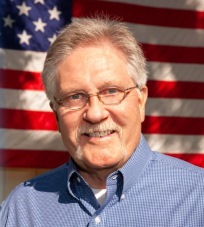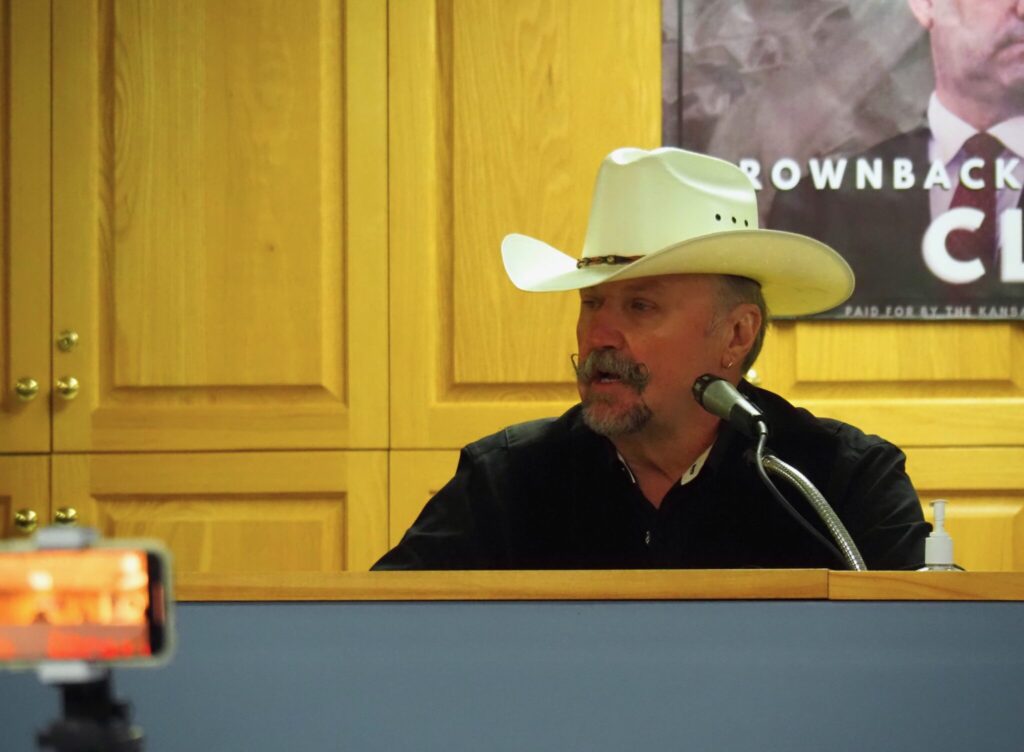Two candidates are seeking the Republican nomination in the 33rd District, Kansas House.
Clifton Boje and Mike Thompson are running for the Republican nomination.

Boje, 44, of Bonner Springs, said he is seeking office primarily to deal with the abortion issue.
“I want to see it criminalized as murder, for putting to death God’s creation unjustly,” he said.
Boje said he would support a proposed law that would classify abortion of living children as homicide. Homicide laws already in effect then would take care of the process, he said. A bill has been crafted and already was introduced, and would be reintroduced next session, he said.
Boje said the proposed law would not apply to miscarriages, or to cases in which the child dies at some point that is not part of an abortion. He said it would apply if the child is being put to death on purpose.
He said he spends a lot of time in front of Planned Parenthood offices, trying to convince women to let them help. (A video of Boje’s protest at a Planned Parenthood clinic, with arguments back and forth on loudspeakers, has been posted on YouTube by those who support pro-choice at https://www.youtube.com/watch?v=m9QXcT4vA9Y.)
Boje teaches private music lessons and plays music for his church, Cornerstone Community Church. He is the founder of Acorn Performing Arts.
Boje has three associate degrees, including two in general studies and one in worship and music. His degrees were from Johnson County Community College and Kansas City College and Bible School, now called Kansas Christian College, in Overland Park. He studied music at the college level but did not complete his bachelor’s degree.
Besides his church membership, he is a member of Kansas Abortion Is Murder and Abolish Abortion Kansas.
Boje said the abortion issue is the main reason he ran, and he has been studying other issues that may come before the Legislature. He said he wants to see the government “doing its main job under what God has given it to do,” which is “to protect people and their personal property.” He also said people should be encouraged to be accountable in their actions.
See more information about Boje at bojeforkansashouse.mystrikingly.com.

Mike Thompson, 71, said he has lived a life of service, and now that he is retired, he would like to be of service to democracy.
That is one of the reasons he is running for office, he said.
Thompson served as an Army chaplain, and before that in the U.S. Navy as a SEAL. He retired as a lieutenant colonel.
“As a chaplain I’ve buried soldiers who have died for our freedom, and I do not take that lightly,” he said. “Instead of complaining, I always learned you get in and serve and work to make things better.”
Another reason he is running is that it’s time for a new voice in Wyandotte County, he said.
“What I can bring to the table is the new voice,” he said. His background demonstrates his integrity, honesty, commitment and loyalty, he said.
It also demonstrates the ability to relate to people of all diverse areas of life, being open-minded and listening to them, he said.
“Ninety percent of what I did in the hospital in the military was counseling, and I learned to listen and be open to both sides, and listen to what’s going on behind the presenting issues,” Thompson said.
As he goes door-to-door in the district, he hears people say they’re ready for a change, he said. The economy plays a role in that.
“If our community prospers, our citizens will prosper, and right now they’re struggling,” he said.
Thompson, who is not the meteorologist by the same name who serves currently in the Kansas Senate, is a retired military officer. He spent 22.5 years with the military, first in the Navy in the 1970s, where he served with the SEAL team, and later, returned to active duty with the Army as a chaplain at age 43.
He served as a command chaplain for the 82nd Airborne, and had different assignments through the years, retiring as garrison chaplain at Fort Leavenworth.
Between his Navy and Army service, he was a chaplain at several hospitals, doing a lot of grief counseling.
Thompson currently serves in his second term on the Bonner Springs City Council. One of his roles is liaison between Bonner Springs city and the Bonner Springs-Edwardsville area church ministers. He also volunteered at Vaughn-Trent Community Services and served as Tiblow Days car show chairman in 2012 and 2013.
Thompson has done undergraduate work at Pittsburg State University, then finished his degree at Dallas Baptist University. He has a Master of Divinity degree from Southwest Theological Seminary, Ft. Worth, Texas, and did internships at two hospitals.
Thompson currently teaches Sunday School at his church. He belongs to the VFW, American Legion and the UDT / SEAL Association. UDT stands for underwater demolition team, including Navy teams who dived in to help astronauts in space capsule recovery.
According to his campaign information, he also is a former Lenexa police officer and a former business owner of a welding shop in Oklahoma.
His campaign information also says he is in favor of growing jobs and wages, cutting wasteful spending, keeping neighborhoods safe, improving public safety, more funding for schools, more say for parents in education, putting families first, protecting constitutional rights and protecting the unborn.
He has endorsements from the Kansas Chamber of Commerce and Kansans for Life.
Campaign finance reports filed this week at the Kansas Governmental Ethics Commission stated that Thompson’s campaign had cash available of $25,062, raising $13,927.17 during the reporting period, expending $4,861.53 and having $20,200.47 cash on hand at the close of the period.
Boje’s campaign filed a statement that said he intended to receive or expend less than $1,000.
See more about Thompson’s campaign at https://thompsonforkansashouse.com/.
Voting details
Early voting in person is currently taking place in Wyandotte County.
Voting on Election Day, Aug. 2, is open from 7 a.m. to 7 p.m. at assigned polling places.
For more information about voting, see https://wyandotteonline.com/early-voting-in-person-starts-saturday/.
Visit the Wyandotte County Election Office website at wycovotes.org or call 913-573-8500 for more details on times and places to vote.
To see an updated map of Kansas House seat boundaries in Wyandotte County, and determine what district you are in, visit https://www.wycokck.org/files/assets/public/election-office/kshouseofrep24x36clip.pdf. Some boundaries recently changed.
Registered voters also can learn their district number and see what will be on their ballot at Voter View, https://myvoteinfo.voteks.org/VoterView.
To see a story about the Democratic candidates for the 33rd District, visit https://wyandotteonline.com/33rd-district-attracts-three-democratic-candidates/.
To reach Mary Rupert, editor, email [email protected].

